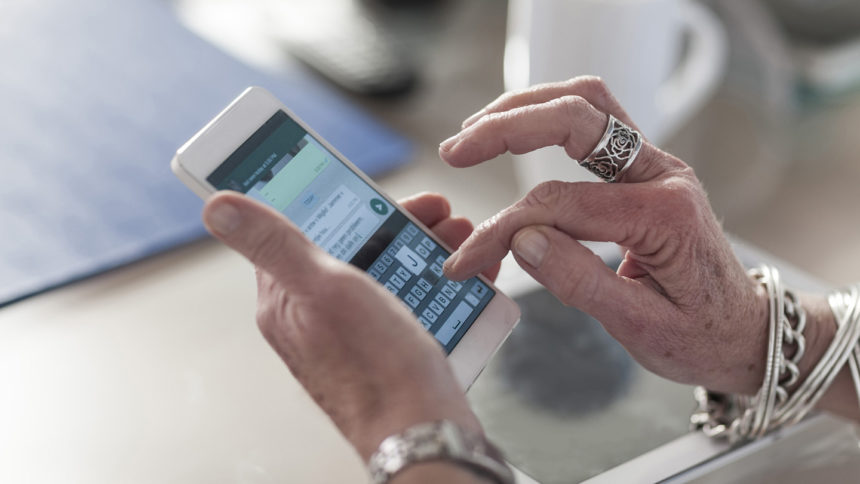
(Credit: Westend61 / Getty Images)
Older adults could benefit from smartphone reminders and mobile health apps in managing medications and chronic conditions, according to two recent studies.
A University of Missouri and Baylor University study recently published in the Journal of the American Geriatrics Society found that older adults living with dementia or mild cognitive disorders can learn smartphone-based memory strategies, which improved memory function and independence.
The study tracked how 52 older adults performed with various memory tasks for four weeks. Digital voice recorder or reminder apps were used to send reminders about upcoming events and activities, including medication management and grocery shopping. Participants were asked to take photos at certain locations or to make phone calls on certain days.
Preliminary evidence showed that not only can older adults with cognitive impairment be trained on how to use the technology, but that it helped with memory and improved quality of life.
“If we can encourage the use of technology-based strategies in older adults with thinking issues, they may have better memory performance over the long term,” MU School of Health Professions Assistant Professor Andrew Kiselica, study co-author, said in a statement.
Funding for the study was provided by Microsoft and the National Institute on Aging.
Most aren’t using health apps
Another study from the National Poll on Healthy Aging found that although mobile apps can help individuals meet health goals and manage chronic conditions, most older adults aren’t using them.
The poll also found that individuals in poor health and those with lower incomes or education levels were far less likely to have ever used such apps. Half of those respondents said they were not interested in health apps.
According to the poll, less than half (44%) of respondents aged 50 to 80 years said they used a health-related app on their smartphone, wearable device or tablet.
Only 28% of older adults reported using at least one app. One-third reported using apps to track exercise (34%), whereas a smaller percentage used apps to track nutrition (22%), weight (20%), sleep (17%), blood pressure (9%), to guide meditation (8%) or to manage mental health and stress (5%). One-fourth of users said they shared information from their apps with their healthcare providers.
Of interest for diabetes management
The study authors said the potential of health apps is especially important for older adults with diabetes.
Among older adults with diabetes, just 28% reported using an app to log blood sugar levels, whereas 14% said they used an app to log medications. But in a hopeful sign, almost half of the older adults with diabetes said they would be interested in using an app for these purposes.
Only 11% of those polled who have Type 2 diabetes said they use a continuous glucose monitor, which can connect with mobile devices to provide blood sugar readings into an app. But 68% said they had heard of such devices, and more than half said they would be interested in using one.
“Now that most older adults have at least one mobile device, health-related apps can provide an opportunity to support their health-related behaviors, manage their conditions and improve health outcomes,” said study author Pearl Lee, M.D., a geriatrician at Michigan Medicine the University of Michigan’s academic medical center.
Technology use
Separately, AARP Vice President of Consumer Insights Indira Venkat pointed to research showing a sharp increase in older adults buying and using technology during the pandemic, as well as interest in using technology to track health.
“With more people 50-plus owning and using technology, we may start to see an increase in older adults using apps to monitor their health,” she said.
And although data show that 61% of people 65 and older own a smartphone, there is a lack of awareness, or mistrust of the security, of health apps, holding many older adults back from using health apps, according to AARP.
“People who describe their health as fair or poor — the people who might be most in need of the kind of tracking, support and information a good health app can give — were significantly less likely to use such apps than those who say they’re in excellent, very good or good health,” said Preeti Malani, M.D., director of the poll. “Health providers should consider discussing the use of health apps with their patients, because one-third said they had never thought about using one.”
The National Poll on Healthy Aging was conducted by NORC at the University of Chicago for the University of Michigan Institute for Healthcare Policy and Innovation. It was administered online and via phone in August 2021 to 2,110 older adults aged 50 to 80 years. It was supported by AARP and Michigan Medicine.




